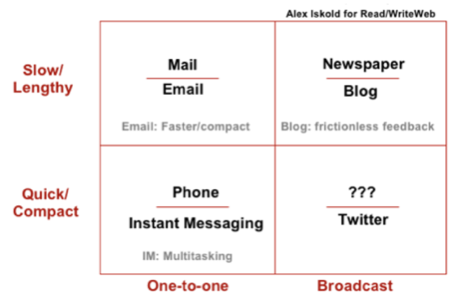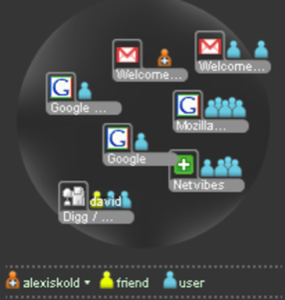Colorado-based Me.dium is announcing today a $15M Series B round led by Commonwealth Venture Partners. Me.dium is developing a next-generation collaborative browsing technology that dynamically combines visualization and chat. We covered Me.dium during its February launch at DEMO. We noted at the time that me.dium appeared quite intrusive on users – both from privacy and activity point of view. So how has it developed since then?

Since DEMO, the service has gone through a round of improvements and revisions. I spoke to founder and CMO David Mandell, who told me that the beta has been expanding nicely and that there has been a lot of very positive feedback coming from users. This would have to be the case, otherwise why would CVP send a huge check across the country (current investors Spark Capital, Appian Ventures and Brad Feld also participated in this round). So why do these VCs think that me.dium has such big potential? It so happens that Me.dium has a chance to literally break outside the box that we described in our recent Evolution of Communication post. Remember the following diagram:

Me.dium’s collaborative browsing vision
When we wrote about Me.dium over four months ago, we described it as ‘social browsing’. Perhaps a refinement of this would be collaborative browsing, and that would be a more precise definition of what the company is trying to do. At the heart of Me.dium is the idea that by enabling real-time discovery and communication during browsing, this will enable people to get things done faster and in ways not possible before.
During my interview with the company founders, we discussed the typical scenarios for using Me.dium:
- You and your friend are trying to accomplish a common task;
- You are trying to do something on your own and meet others who are trying to do the same thing;
- You are observing the patterns of crowds nearby and so you are able to discover new things.
An example of the first scenario would trying to book a trip with a friend. You go to a common site, do research and chat with each other. An example of the second scenario would be shopping for a gadget. When you navigate to sites, you notice other people on those sites and you can strike up a conversation with them. In both of these use cases, the idea is to collaborate during browsing to make things easier.

The third example, as explained by the founders, is crowd following. This is similar to the scenario of walking on a street and seeing a lot of people in a restaurant, leading you to decide that this is a good place to be. By analogy, as you are browsing you may notice people flocking to a site – and decide to follow them. To me, this is less likely use cause – because it is difficult to discern behavioral patterns of a crowd, particularly using a network-like user interface. Perhaps if the hot spots were suggested in a different way, then it would be easier to embrace. But these sort of things can be always be tweaked.
What’s next for Me.dium?
So the $15M dollar question is what is Me.dium planning to do next? In a nutshell, the company is planning to spend the money on refining and scaling its sophisticated matching technology. The secret sauce here is in connecting people based on their browsing patterns. Doing so dynamically for hundreds of thousands of users is hard algorithmically and very intense computationally.
Beyond the technology, the company will also have to invest in building a community of followers. Clearly there are a lot of privacy issues here and the fact that your browsing history is being sent to a server in Colorado might not be an exciting prospect. Yet, Me.dium takes a strong stand on information – they say that the user owns all of it. To succeed, the company needs to continue to drum this beat and to act accordingly, which they have been doing so far.
In terms of monetization, if this takes off then the sky is the limit. Me.dium will become a haven for advertisers, because of its huge contextual relevancy. During the interview we discussed several possible future revenue streams, all revolving around contextual ads. But for the foreseeable future the company will remain focused on building its platform and expanding its user base.
Conclusion
So will this work? Can Me.dium become the next communication paradigm, or will it be perceived as a glorified chat? This series B investment puts a serious stake in the ground and announces to the world that the game is on. Certainly the company itself and the investors think that this has great potential to become big. But will it? We are not so sure.
So let’s see what Read/WriteWeb readers think – would you use Me.dium and do you think it will take off?










